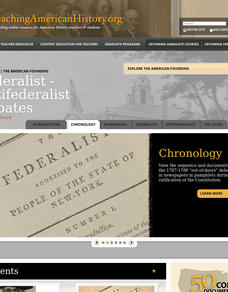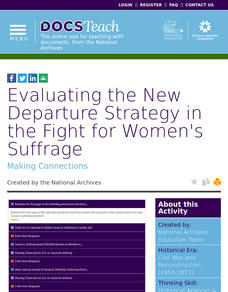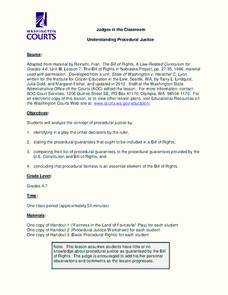Judicial Learning Center
Do You Know Your Bill of Rights?
The Bill of Rights is much more than an important piece of paper! The rights cover everything from freedom of speech to the right to remain silent if arrested. Scholars find out their own rights by answering the questions in the form of...
Teaching Tolerance
Dismantling Racial Caste
It's time to end racism. The final installment of the series encourages scholars to consider what is needed to ended the racial caste system in the U.S. Young historians complete group discussion, written prompt, and a hands-on-activity...
Center for History Education
Speaking Freely In the Soviet Union's Autocratic Government
Speak your mind! The lesson explores the difference in free speech between the United States and the Soviet Union. Academics review the constitutions of both governments, political cartoons, and case studies to understand how freedom of...
K20 LEARN
Oklahoma and Segregation
It was not just the states of the Deep South that practiced segregation. Young historians investigate the history of segregation and desegregation in Oklahoma. They begin by reading, annotating, and analyzing an article about the impacts...
Anti-Defamation League
The Road to Brown
As part of the study of segregation in U.S. schools, scholars research and create a timeline of events that led to the historic Supreme Court case, Brown V. Board of Education. Groups research a topic or event that led to the decision,...
Ashbrook Center at Ashland University
Federalist - Antifederalist Debates
Who should have the power—individual states or the federal government? Scholars research the arguments of the Federalists and Anti-Federalists during the formation of the United States Constitution. Online resources, including a vast...
EngageNY
Studying Conflicting Interpretations: Perspectives on Plessy v. Ferguson: Part 3
Scholars closely read Justice John Marshall Harlan's dissenting opinion in the Plessy v. Ferguson case, seeking to understand why he disagreed with the court's decision that racial segregation laws for public spaces were constitutional....
C-SPAN
Supreme Court Justices Research and Resumes
According to Article III, Section1 of the United States constitution, the only qualification one needs to be appointed to the Supreme Court is to demonstrate "good behavior." The president and Congress are given the power to determine...
DocsTeach
Evaluating the New Departure Strategy in the Fight for Women's Suffrage
When women demanded their right to vote, did the Constitution already protect it? The New Departure Strategy in the women's suffrage movement made this claim through court hearings. Using documents, such as transcripts from Susan B....
Curated OER
The False Parliamentarism of 1791 (3rd Canadian constitution)
Students gain an understanding of the concept of false parliamentarism after the Constitutional Act. They, in groups, represent different members of government as they draft, debate and try to pass a bill into law.
Curated OER
Dekanawidah- A Forgotten Founding Father
Students compare plans for government. In this early American history lesson, students compare and contrast the U.S. Constitution with the Iroquois Constitution. Students identify cultural features, government functions, and citizenship...
Curated OER
Create a New Amendment
Students review and discuss the important points of the amendments to the Constitution. They discuss the guidelines for adding a new amendment to the Constitution. Students brainstorm ideas for the new amendment.
Curated OER
Government and Politics
After a class lesson the U.S. Constitution and its amendments, learners can apply their knowledge to this activity. Several questions prompt students to add missing key terms, such as the year the Constitution was written and the number...
Curated OER
We Are the Government
Learners read primary documents to find the motivations of the founding fathers of the United States. In this primary documents lesson, students discuss the meaning of the Preamble to the Constitution, read parts of the Constitution...
Curated OER
The Bill of Rights
Seventh graders determine why the Bill of Rights was added to the Constitution. In this U.S. government lesson, 7th graders discuss the first 10 amendments and any vocabulary they may be unfamiliar with. Students then read different...
Curated OER
The Role of the Executive Branch in the Lawmaking Process
Students research the Executive Branches role in making a law. In this law making lesson plan, students study the history of the Constitution and see how much power the President has in making a bill into a law. Students then research on...
Curated OER
The Taliban Meets the Bill of Rights
Students contrast the Taliban and the Constitution. They read through "What the Taliban Banned" and identify "rights." They determine if rights in the United States are in danger and if the Taliban violate the first ten amendments to...
Curated OER
Democracy: An Introduction.
Students study the U.S. Constitutional System and how it compares with forms of democracy that developed in ancient Greece and Rome. They list and explain the requirements it takes to form a society to be considered a nation.
Curated OER
A Time for Justice
Students engage in a lesson that focuses on the development of The Bill Of Rights in the United States. They conduct research using a variety of resources. Students two focus questions in order to guide the information search. They state...
Curated OER
The Roots of Our Rights
Students examine the Preamble to the Constitution. In this government lesson, students read the Preamble of the Constitution and define the meaning of unknown words. Students write about examples of how the Constitution protects our rights.
Curated OER
Understanding Procedural Justice
Learners analyze the concept of procedural justice. For this judges in the classroom instructional activity, students role play the ways the U.S. Constitution and Bill of Rights established certain procedures to protect people from...
Curated OER
How is Our Government Organized?
Young scholars explore rights of their clients. In this constitutional law lesson plan, students play an online game that requires them to review individual cases in order to determine the rights their clients have.
Curated OER
Password
Students identify vocabulary words from the Bill of Rights and the Constitution. In this vocabulary lesson plan, students are given clues and say the word from the clues.
Curated OER
History Biographies
Students explore the life and the contributions of five people from U.S. history in the five lessons of this unit. james Madison, Dolly Madison, Sequoyah, Harriet Tubman, and Clara Barton are presented to students for exploration and...
Other popular searches
- Us Constitution Lessons
- Texas Constitution Lessons
- Constitution Lessons Grade 3
- U S Constitution Lessons
- U.s Constitution Lessons
- The Constitution Lessons

























